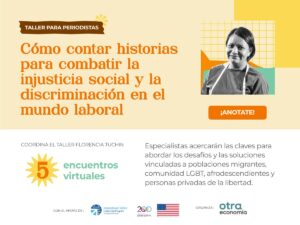The independent news outlet Otra Economía, based in Argentina, has been operating since November 2022 and is focused on covering models and initiatives that promote new economic models in Latin America and the Caribbean. It offers a workshop "How to tell stories to combat social injustice and discrimination in the workplace," aimed at journalists from Latin America. The director and editor of the news outlet, Florencia Tuchin, told Latam Journalism Review (LJR) about the workshop and how this new Argentinean news outlet proposes to change the way we look at the current economic model.
Tuchin is a solutions-based journalist, specializing in sustainability and human development. In 2022, the U.S. Embassy invited her to participate in a program on racism and social justice. In a three-week tour of Washington, Alabama, Oklahoma, and Chicago, "I learned about the manifestations of racism in the United States and its daily effect on accessing rights," she said.
Aiming to replicate in Latin America what she learned in the United States, she submitted the project to the Bureau of Educational and Cultural Affairs of the U.S. Department of State and the Meridian International Center. The workshop, which has the financial support of these institutions, will provide training to participants in addressing challenges related to social injustice and discrimination in the workplace. And it will target vulnerable communities such as Afro-descendants and Indigenous people, LGBTQ+ populations, migrants and incarcerated people.

Workshop "How to tell stories to combat social injustice and discrimination in the workplace." (Courtesy: Florencia Tuchin)
There will be five virtual meetings of an hour and a half each, with the participation of organizations and leading specialists on the subject such as Fundación Encontrarse en la Diversidad, Mocha Celis, Ashoka, Red Creer and historian Omer Freixa. "Participating journalists will learn how to tell their stories with a focus on solutions and sensitivity, to generate a positive impact on society," Tuchin said. "They will also be able to learn about the labor inclusion challenges faced by various communities vulnerable to the current economic system." On the solutions approach, she adds that "the intention is to talk about the challenges, but also how organizations work to confront and improve this system, generating new economies."
Once the workshop is over, journalists will be asked to propose articles and ten ideas will be selected with the possibility of publishing the stories in Otra Economía, thus reaching a wider audience, Tuchin said.
Thinking about journalistic coverage of the challenges faced by vulnerable communities in Latin America in terms of labor inclusion, Tuchin proposes three recommendations:
1) Delve deeper into human stories: Highlighting the voices of people facing discrimination in the workplace can create empathy and understanding.
2) Contextualize with data and analysis: Supplement stories with data that support the magnitude of the problem and its impacts on society.
3) Explore approaches to solutions: Highlighting initiatives and programs that are actively addressing labor inclusion can inspire others to take action.
"In many instances,the increasing precariousness of work is a factor experienced in the media. In this sense, it's not isolated from society, these are companies and represent interests," the journalist said. This shows how complex it is for the media to deal with facts related to labor precariousness and workers' rights.
Another challenge she has identified is that, usually, "traditional media focus more on facts and figures than on the human stories behind the precarization of work." The lack of personal stories in the media, according to Tuchin, "can make the public fail to connect emotionally with the real challenges faced by workers."
At the same time, the specialist believes that many times work precariousness is covered in the context of specific events, such as protests. "This can lead to a fragmented understanding of the problems and their deeper causes," she added. For her, the great challenge lies in "balancing the coverage of economic issues with their social impact. Journalism must succeed in linking these issues to people's lives and highlight how economic decisions directly affect society."

Florencia Tuchin, Argentine journalist and director of Otra Economía (Courtesy: Florencia Tuchin)
In this context, Another Economy, founded by Tuchin, aims to spark conversations around triple impact, circular economy, entrepreneurship and social innovation. With these concepts they aim to make visible new ways of producing and consuming, as opposed to the current model that "leads to the scarcity of resources, environmental pollution, and the acceleration of global warming," explains Tuchin in this article. But also to value companies and projects that seek to generate impacts beyond the economic, such as social and environmental, what they call triple impact.
On the other hand, Tuchin reports that "a community of readers who seek to be agents of change" is being formed around the news outlet. According to the journalist, "the outlet is designed for people who do not want to scroll and scroll in traditional media to find news related to the subject."
Its audience includes leaders of social organizations, entrepreneurs, people in charge of sustainability areas and consumers who seek to generate a positive impact with their purchases. They also have a newsletter that enables feedback with the community, and many times it is the audience itself that drives conversations that interest them.
One of the highlights of the news outlet is that they use a solutions approach to storytelling. For Tuchin, "it's more than just identifying problems, it's about providing inspiration and ways forward. She added, "We don't just expose injustices, we explain the experiences of individuals, organizations and communities that are working to bring about positive change."
The ultimate goal, for her, is to "empower readers, showing them that there are alternatives to traditional economic models and that everyone has a role to play in building a more just and sustainable economy."
For a news outlet based in Argentina, it is relevant to reflect on the consolidation of the far-right, led by Javier Milei, in the recently held primary elections (PASO). According to Tuchin, this new political scenario "may generate a more challenging context for the coverage of inclusive economies. However, this may also be a crucial moment to highlight the importance of these alternative economic perspectives." As such, she stresses that it is crucial that independent or alternative media continue to provide spaces to amplify the voices of vulnerable communities.
--
Contributor Florencia Pagola is a freelance journalist from Uruguay. She does research and writes about human rights and freedom of speech in Latin America.